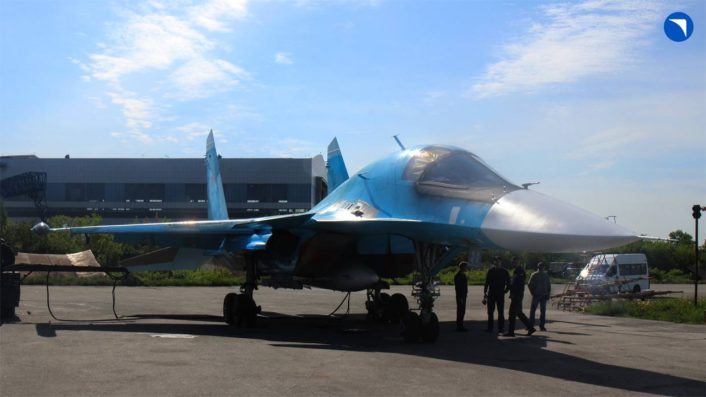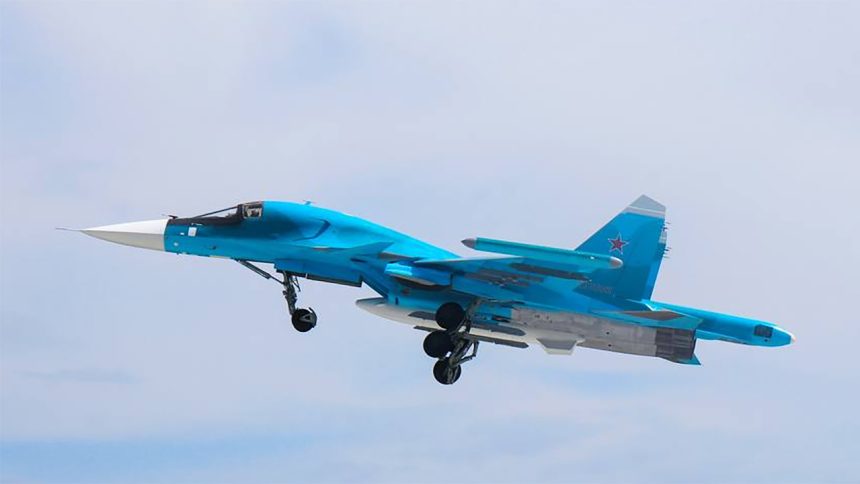The addition to the fleet comes amid considerable losses of the fighter since the beginning of the war. According to the most recent reports, the Russia Aerospace Forces have lost 34 Su-34s in combat.
Russia’s UAC (United Aircraft Corporation) rolled out the “next batch” of Su-34 Fullback fighters from the Novosibirsk Aviation Plant, to be subsequently “sent to troops” following a “series of factory tests.”
While the statement from the company does not mention the number of Su-34s involved, photos and videos suggest two aircraft were delivered. This represents the second delivery of Su-34s in 2024, as two other aircraft rolled out in April, making it a total of four Fullback units finishing construction this year.
The aircraft recently delivered were also shown carrying EW (Electronic Warfare) pods on the wingtips. The pods resemble the L-175 Khibiny series of EW/ESM systems, an electronic countermeasures system designed to detect ground AD (Air Defense) ‘painting’ the fighter and attempt jamming their targeting systems.
Oryx, the leading open-source intelligence and military research forum, has counted Russia having lost 24 to 26 Su-34s by the end of 2023, with four of them lost during “non-combat related incidents.”
On Feb. 29, 2024, Western reports quoted Ukrainian military officials claiming to have shot down 11 Russian planes in 11 days, including eight Su-34s, two Su-35s and an A-50 AWACS aircraft, bringing the total number of Fullbacks lost in combat at 34 units.
UAC delivered a batch of new-build Su-34 NVO strike fighters to the Russian MoD (specifically, to the VKS). This is the first batch delivered in 2024. Unclear how many aircraft; the photos and video accompanying UAC’s press release appear to show two. https://t.co/pA6CUCiQUa pic.twitter.com/4nK9oWXnsV
— Guy Plopsky (@GuyPlopsky) April 5, 2024
Frontline Battlefield Interdiction Strike Jet
The Su-34 is the Russian mainstay fighter-bomber currently undertaking battlefield interdiction and standoff glide bomb strikes, employing the UMPC-kitted FABs. The heavy use of the Fullback is also visible in the frequency with which it is featured in RuMoD (Russian Ministry of Defense) public communication material, which is nearly three times a week.
Standard Su-34 videos released since last year show pilots undertaking pre-flight checks, shots of the UMPC-FAB bombs installed on the aircraft, the taxi roll, take-off, the weapon release and the effects on the targets recorded by overhead drones.
Since May, Su-34s were recorded employing the UMPB D-30SN glide bombs against Ukrainian targets. Unlike standard FAB-series of bombs combined with the UMPC (Universal Module for Planning and Correction) kit, the new bomb is equipped with an internal engine allowing it to extend the range.
Woah, Russian UMPB glide-bombs seen in action for first time:
⚡️🇷🇺 The latest Russian UMPB aerial bombs
Our front-line Su-34 bomber, drops UMPB D-30SN glide bombs on Ukrainian militants in Kharkov.
👉 Unlike standard FABs with UMPC, this bomb has its own engine and is… pic.twitter.com/1Y362JeMAB
— SIMPLICIUS Ѱ (@simpatico771) May 22, 2024
The RuMoD says the Su-34 is usually employed to drop the UMPC-FAB bombs on targets such as “enemy command posts,” “manpower targets,” “Ukrainian strongholds,” “temporary deployment,” “troops clusters” and “hardware.” These missions are usually carried out by “missile and bombing strikes” with “guided munitions.”
New Aircraft Added
“Rostec’s Aviation enterprises continue rhythmic deliveries of military aircraft according to the current year’s production program,” said Rostec’s First Deputy Director General, Vladimir Artyakov, in a statement. “The next batch of Su-34s has been transferred to the Russian Aerospace Forces. These bombers are in great demand today in the Northern Military District zone. The aircraft’s capabilities allow pilots to effectively carry out missions in any theater of military operations using unguided and guided aircraft weapons.”
The Su-34 fighter-bomber is described as “designed to destroy ground (surface) and air targets, infrastructure facilities covered by air defense systems and located at significant distances from the home airfield.” Rostec’s stament further adds: “The aircraft can operate under enemy fire and electronic countermeasures day and night, in simple and difficult weather conditions.”
“Today, UAC enterprises are increasing the production of aircraft. To do this, we are improving technological and business processes at our production facilities, finding additional reserves to increase production volumes,” said UAC (United Aircraft Corporation) General Director Yuri Slyusar.

Tactical importance and war of attrition
The Su-34 is an all-weather supersonic medium-range fighter-bomber/strike aircraft with swept-back canards and a cockpit with side-by-side seats.
The ongoing production and the consistent use in combat despite the losses (indicated in RuMoD’s press material) underscore the plane’s vitality in Russia’s ground war, which aims to take as much as territory as possible before the arrival of the F-16s in Ukraine.
Incremental tactical territorial gains across the frontline allows Russia to curtail Ukrainian land operations, since it leaves the adversary with less land to conduct its own attack drones, general infantry counter-offensives, HIMARS (High Mobility Artillery Rocket System) and ATACMS (Army Tactical Missile System) strikes. These would have to be in sync with ground strike missions carried out by F-16s in a mutually supporting role.
Russian pressure to contest the battlefront, and occasionally capture new territory from Ukraine, forces a focus on retaking lost positions and opens up new tactical positions for Moscow to turn up even more pressure. Su-34s destroying large battlefield targets with the glide bombs, which are hard to detect and shoot down by ADs, aid in this goal. For instance, the importance of glide bombs can be seen in Ukraine’s own employment of the US-made GBU-39, which The Aviationist reported was seeing a high success rate against Russia.
The numerical inferiority of its air force and the limits of the Western weapons’ integration on the Soviet-era fighters is preventing Ukraine from carrying out large front-wide coordinated air and land offensives, limiting the success to small sectors. Previous reports on the NASAMS-fired AIM-9X Sidewinder and an interview of a Ukrainian Su-27 pilot noted how the battlefield situation also depends on an industrial capacity gap between the two countries. The ability to quickly replace inevitable losses of large platforms is ultimately deciding the war’s strategic outcome.









